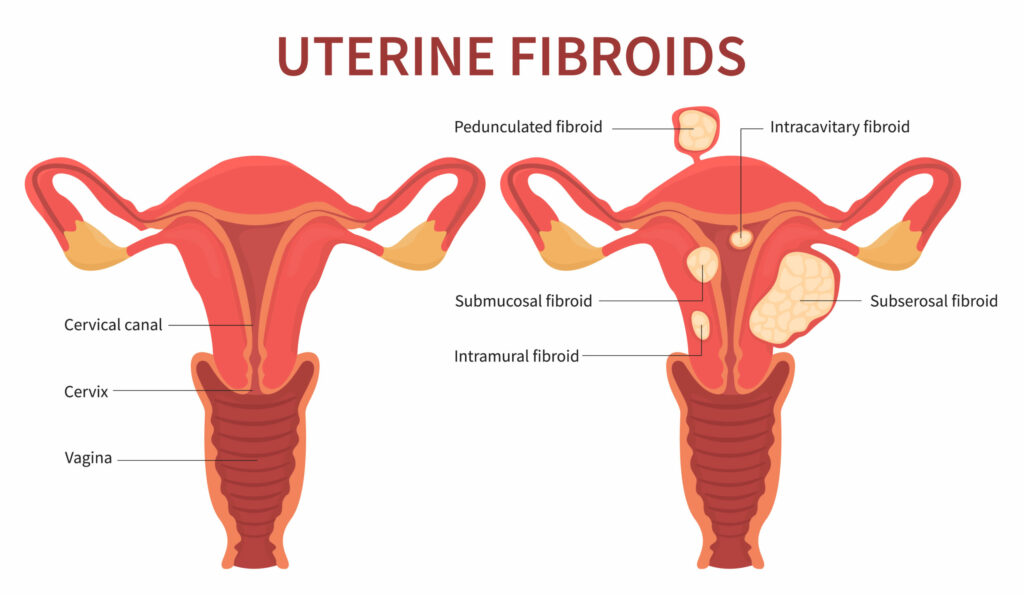Access your own patient portal, provided by NCSH.
Gynecology
Which Size of Fibroid Is Dangerous?
Wed, Jan 24, 2024

A uterine fibroid is a smooth muscle tumor that grows in or near the uterus in women. They are very common, occurring in up to 20% of women of childbearing age. Among all women, nearly half will have at least one fibroid by age 50. Fibroids are typically benign, but as they get bigger, they are more likely to cause symptoms that require treatment.
About Uterine Fibroids
Fibroids are common. They can range in size from microscopic to inches across. The causes are not fully understood but probably involve hormonal changes and genetics. Treatment isn’t always necessary, but depending on the size and location, either surgical or nonsurgical treatment may be necessary to resolve symptoms or prevent complications.
Are Uterine Fibroids Dangerous?
Most uterine fibroids are not dangerous. They are not usually cancerous and are often small enough that they do not cause symptoms. The location of the fibroid and an increasing size can make them uncomfortable or even lead to complications. For instance, a fibroid can lead to infertility and rarely can become cancerous.
Fibroid Size Classification
Fibroids are classified by location (uterine wall, outside the uterus, in the uterine muscle tissue), but size classification is also important. The size can range from barely detectable to large enough to fill the abdominal cavity. A general way to describe the size of a fibroid is from very small to large:
- Very small – 0.5 to 0.9 cm
- Small – 1.0 to 1.9 cm
- Medium – 2.0 to 2.9 cm
- Large – 3.0 cm and up
In rare cases, fibroids can be much larger than 3.0 cm, up to several inches across or filling the pelvis or abdominal cavity.
How Much Does a Fibroid Weigh?
Small and medium fibroids don’t weigh more than a few grams. The largest fibroids can weigh a few pounds. These larger fibroids can cause weight gain, often rapid. This is not true weight gain; rather, the fibroid itself is causing an increase in weight.
Does Uterine Fibroid Size Matter?
 Discussions of uterine fibroid size are important because size can affect symptoms. Fibroids may remain small, but they can also grow rapidly and cause symptoms:
Discussions of uterine fibroid size are important because size can affect symptoms. Fibroids may remain small, but they can also grow rapidly and cause symptoms:
- Changes in menstruation, including more frequent or heavy periods
- Heavy menstrual cramping
- Bleeding between periods
- Anemia
- Pain in the abdomen or lower back
- Pressure in the abdomen
- Difficulty urinating or more frequent urination
- Constipation or difficult bowel movements
- Pain during sexual intercourse
Nonsurgical Treatments for Fibroids
Whether fibroids need treatment depends on several factors, including symptoms, fibroid location, fibroid size, and plans for pregnancy in the future. Doctors often try conservative, nonsurgical treatments for symptom-causing fibroids before resorting to surgery:
- Prescription or over-the-counter pain medications
- Birth control pills
- Intrauterine device
- Hormone blocker medications or hormone modulators
Which Fibroid Size Requires Surgery?
Size is not the only factor to consider when deciding to undergo surgery for fibroids. However, it is important, especially if the fibroids are large or very large. The choice of treatment should be made by the patient and doctor together and must consider important factors, such as whether the patient is planning for pregnancy later.
Surgical treatment options for uterine fibroids are often minimally invasive and include:
- Endometrial ablation. This treatment destroys the uterine lining and is most often used for small fibroids.
- Uterine artery embolization. This procedure involves blocking arteries that send blood to fibroids to shrink them and reduce symptoms.
- Ultrasound. Using MRI to guide it, ultrasound therapy can destroy fibroids. This is typically used for patients with just a few larger fibroids.
- Myomectomy. A myomectomy is surgery to remove fibroids while attempting to preserve healthy uterine tissue.
- Hysterectomy. The only definitive cure for fibroids and to ensure they do not come back is a hysterectomy. This procedure removes part or all of the uterus. It is usually reserved for women who do not want to get pregnant or who have large fibroids and severe symptoms.
Before choosing any treatment for fibroids, talk to your doctor about your pregnancy plans. These procedures may affect your fertility.
If you have symptoms of fibroids or questions about treatment, make an appointment to consult with one of NCSH’s gynecology specialists.
RELATED NEWS

When to See a Doctor for a Painful Period
It’s perfectly normal for your monthly period to cause some discomfort, but it should never be extremely painful. Abnormal period cramps can be a sign of a more serious medical issue, like endometriosis. Talk to…
Continue Reading
Stay Current
Educational Articles & More
View News & Press